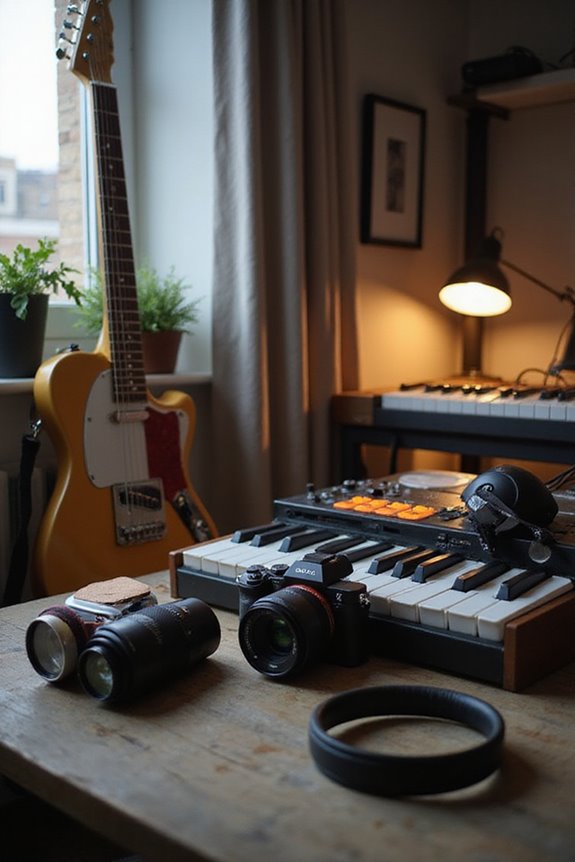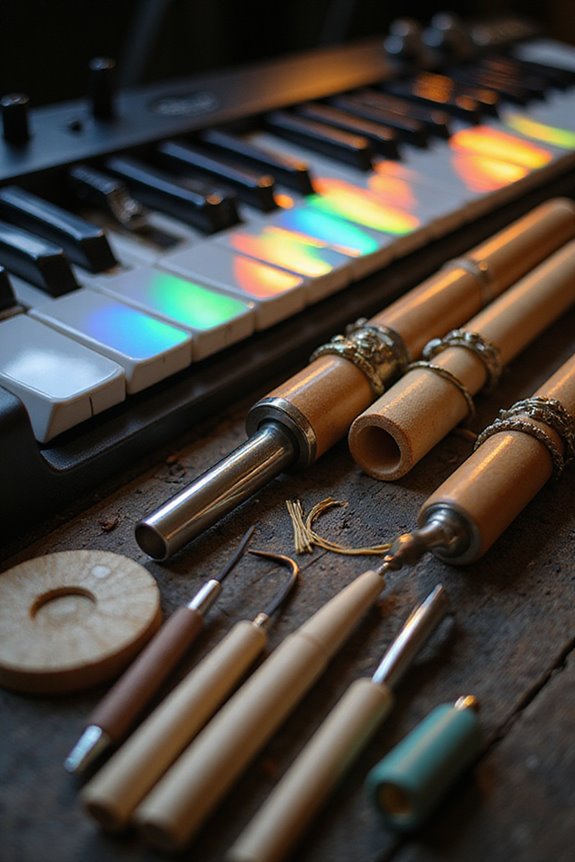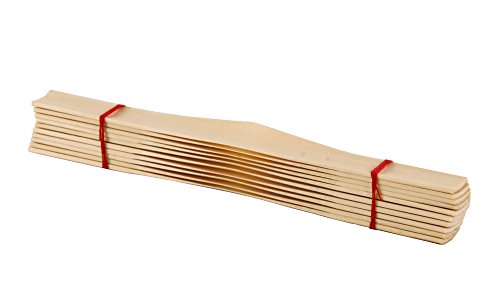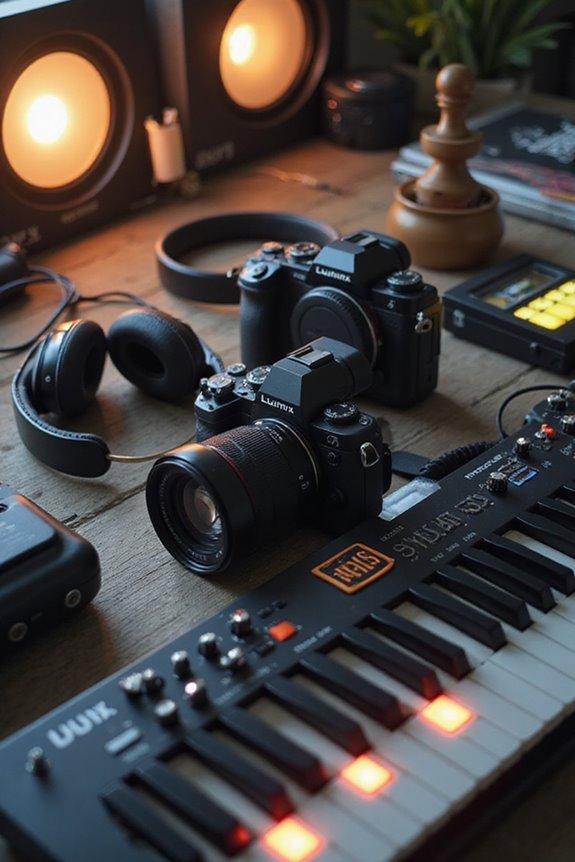As an Amazon Associate, we earn from qualifying purchases. Some links may be affiliate links at no extra cost to you. Although our opinions are based on curated research, we haven't used these products. Articles generated with AI.

The 5 Best Bassoon Reed Making Kits for Musicians Who Demand Perfection
If you’re aiming for perfection in bassoon reed making, you’ll want to take into account the top kits available. The Vandoren HBSP40 Heckel Cane offers premium quality, while the Jones JR201AM Artist Reed elevates sound performance. Don’t forget the versatile black plaque, durable wire, and a well-designed drying rack for ideal results. Each component contributes to a customized reed experience that meets your exact preferences. Continue to explore the essential factors that influence your selection for ultimate satisfaction.
Key Takeaways
- Consider high-quality gouged cane, like Vandoren HBSP40, for premium sound with minimal adjustments needed.
- Use adjustable wire for stable cane holding during shaping, ensuring precision in reed crafting.
- Select durable tools like stainless steel drying racks for longevity and efficient reed drying capacity.
- Look for user-friendly features in plaques that allow for smooth insertion and safe handling.
- Opt for bundles of materials to save costs while ensuring you have ample supplies for perfect reed making.
Bassoon Reed Making Supplies – Plaque (Black)
Reed123 Bassoon Reed Making Supplies - Plaque (Black)
- Reed123 plastic bassoon plaque is made of a nice smooth plastic
- No rough edges, so it goes in and out of the reed safely and smoothly
- Available in Red & Black
Each plaque is tested by professional bassoonists, reflecting a commitment to quality. Although some users express concerns about pricing for plastic, the value it adds to your crafting process can’t be overstated. It’s worth considering for your next reed-making session!
Best For: Professional bassoonists and amateur reed makers looking for high-quality, easy-to-use bassoon reed making supplies.
Pros:
- 100% hand-made and tested by professional bassoonists, ensuring high quality and performance.
- Made from smooth plastic with no rough edges, providing safe and smooth insertion into reeds.
- Prevents knife wear compared to metal plaques, enhancing the longevity of your tools.
Cons:
- Some users feel the pricing for a plastic item is on the higher side.
- Limited color options, with only Red & Black available.
- Certain reviews mention a discrepancy in value, questioning whether the price aligns with the material choice.
Bassoon Reed Making Supplies – Wire
Reed123 Bassoon Reed Making Supplies - Wire
- 150 inches (4 meters) length
When you’re crafting high-quality bassoon reeds, investing in a reliable wire can greatly enhance your process. This durable metal wire, measuring 150 inches, holds your cane securely, ensuring precise alignment. Its flexibility allows you to adjust easily during the shaping process, giving you complete control over your reeds.
Although some users noted the four ends on the spool were a bit cumbersome, they found it manageable. With a perfect customer rating of 5.0 stars, this wire stands out in the market. It’s time to elevate your reed-making experience with supplies that support your dedication to perfection.
Best For: Bassoon players and reed makers who seek high-quality, durable supplies for crafting and adjusting reeds efficiently.
Pros:
- Durable Material: Made of quality metal that effectively holds cane in place.
- Easy Adjustability: Flexible design allows for simple handling and adjustments during the reed-making process.
- High Customer Satisfaction: Maintains a perfect rating of 5.0 stars from users, indicating strong approval and reliability.
Cons:
- Four Ends on Spool: Some users find the four ends of the spool a bit cumbersome to manage.
- Limited Availability: May not be widely available in all music supply stores, requiring online purchasing.
- Potential Price Variability: Users are encouraged to report lower prices, which can lead to fluctuating costs.
Vandoren HBSP40 Heckel Bassoon Gouged and Shaped/Profiled Cane
Vandoren HBSP40 Heckel Bassoon Gouged and Shaped/Profiled Cane
- Vandoren double reeds are all made with cane grown, nurtured and harvested in the south of France. Accept no substitutions.
- Comes in bundle of 10 pieces
- Best cane for making your own bassoon reeds
For both novice and experienced players, the Vandoren HBSP40 Heckel Bassoon Gouged and Shaped Cane is a prime choice in bassoon reed making. This high-quality French cane, measuring 5 x 1 x 1 inches, comes in a bundle of 10 pieces, streamlining your reed-making journey. Crafted for superior sound quality, it requires minimal adjustments before play. Many users appreciate its ease of use and time-saving features. Rated 4.2 out of 5 stars, feedback highlights satisfaction with its performance. Whether you’re refining your skills or creating professional-grade reeds, this cane is a reliable investment for your musical needs.
Best For: The Vandoren HBSP40 Heckel Bassoon Gouged and Shaped Cane is best for both novice and experienced bassoon players looking to streamline their reed-making process.
Pros:
- Time-saving: Comes in a bundle of 10 pieces, making the reed-making process more efficient.
- High-quality material: Made from top-quality cane from the south of France, ensuring superior sound quality.
- Minimal adjustments needed: Requires little final adjustment for playability, catering to players of all skill levels.
Cons:
- Limited availability: May not be readily available in all music stores or regions.
- Price competitiveness concerns: Customer feedback encourages manufacturers to consider competitive pricing.
- User ratings are based on a small sample size: The 4.2-star rating is derived from just three ratings, which may not represent a broader consensus.
Bassoon Reed Making Supplies – Drying Rack and Board
Reed123 Bassoon Reed Making Supplies - Bassoon Reed and Oboe ReedDrying Rack/Drying Board
- Reed123 Bassoon Reed Making Supplies -- Drying Rack
- Made from High Grade Stainless Steel and Crystal Acrylic Board
- Removable Metal Pins For 10 Bassoon Reeds
Finding the right drying rack is crucial, especially for music majors and college students honing their reed-making skills. The Reed123 Bassoon Reed Making Supplies drying rack offers a solid base resembling glass, combining functionality with a modern aesthetic. Its high-grade stainless steel construction guarantees durability, while the crystal acrylic board enhances its appearance.
With removable metal pins, you can dry up to ten reeds simultaneously. Users rave about the ease of transport, making it practical for different locations. Whether you’re drying reeds at various stages or simply working in a small space, this rack is a great choice.
Best For: Music majors and college students involved in bassoon reed making.
Pros:
- Durable construction with high-grade stainless steel and crystal acrylic board.
- Removable metal pins allow for drying up to ten reeds at a time, enhancing efficiency.
- Modern aesthetic and solid base provide stability while also being easy to transport.
Cons:
- Limited capacity for only ten reeds at a time may not meet the needs of high-volume users.
- Potentially higher price point compared to simpler drying racks on the market.
- Requires careful handling to maintain the glass-like appearance and structural integrity.
Jones JR201AM Artist Bassoon Reed Medium
Jones JR201AM Artist Bassoon Reed Medium
- Using unique diamond cutting equipment, exacting gouge can be obtained.
- The profile is produced using advanced robotics, thus allowing the tip to receive extra refinement.
- Each reed is tested and adjusted by our 'Artist in Resident,' a professional Bassoonist.
The Jones JR201AM Artist Bassoon Reed Medium stands out as an exemplary choice for both beginners and seasoned bassoonists seeking a reliable and high-quality reed. Made from premium French cane, this reed measures 1.4 x 0.6 x 3 inches, weighing just 0.352 ounces. Its unique manufacturing process, utilizing diamond cutting and advanced robotics, guarantees precise gouging and refined tips for enhanced intonation.
Users appreciate the easy break-in period, often noting improved sound quality right away. While some might find the reeds a bit thick initially, you’ll often enjoy a balanced tone, making it a solid option for competitions and performances alike.
Best For: The Jones JR201AM Artist Bassoon Reed Medium is best for both beginner and experienced bassoonists seeking a reliable and high-quality reed for enhanced performance.
Pros:
- Improved sound quality noted by users, leading to better performance in competitions.
- Easy break-in period, allowing for immediate playability.
- Symmetrical, well-finished blades ensure even intonation and tone.
Cons:
- Some users find the reeds too thick initially, requiring sanding for better performance.
- Mixed experiences with durability, with some reeds dying quickly.
- A few players may have to make adjustments for optimal playability.
Factors to Consider When Choosing a Bassoon Reed Making Kit

When choosing a bassoon reed making kit, you’ll want to take into account a few key factors. The quality of materials affects the sound and longevity of your reeds, while ease of use can make the process more enjoyable. Don’t forget to check for required adjustments and compatibility with your existing tools, as versatility can enhance your crafting experience.
Quality of Materials
In choosing a bassoon reed making kit, the materials included can make all the difference in your crafting experience. High-grade cane, especially from renowned growing regions, will yield superior sound compared to inferior alternatives. Look for kits that feature durable metal components, as they enhance the overall performance of your reeds. Smooth plastic plaques are ideal since they prevent knife wear, helping to preserve your tools and extend their lifespan. Additionally, consider the weight and dimensions of wire and plaques; these factors can greatly affect your handling and adjustments during the reed-making process. Kits rigorously tested by professional musicians assure you of reliable materials, leading to better-quality finished reeds that you’re proud to play.
Ease of Use
Choosing a bassoon reed making kit that prioritizes ease of use can greatly enhance your crafting experience. Look for supplies with adjustable wire that securely holds the cane, ensuring stability as you work. User-friendly features, like removable metal pins on drying racks, simplify setup and transport, making it easier to take your kit on the go.
Additionally, opt for tools made from smooth materials with no rough edges; this guarantees efficient insertion during the reed-making process. Professional-tested items often provide reliable functionality for musicians of all skill levels. Finally, consider lightweight, compact designs, as they not only enhance portability but also streamline your workflow, helping you focus on creating perfect reeds.
Durability Factors
To guarantee your bassoon reed making kit stands the test of time, it’s essential to evaluate the materials used in its components. High-grade stainless steel and durable plastics can greatly enhance longevity compared to cheap alternatives. Pay close attention to the metal wire securing cane in the reeds; sturdy options resist bending and breaking, ensuring consistent performance.
Additionally, hand-made reeds should meet professional durability standards, so you can trust they’ll hold up to regular use. Look for drying racks and boards that feature solid bases and heavy-duty materials; these will endure frequent handling and transportation. Finally, don’t underestimate customer feedback—higher ratings often correlate with more reliable and durable reed-making supplies, helping you make informed choices.
Required Adjustments
When you select a bassoon reed making kit, consider the necessary adjustments that can greatly enhance your playing experience. Bassoon reeds often need fine-tuning, especially if you’re working with pre-gouged and shaped cane. If your reeds feel too thick, sanding or trimming can help achieve the ideal thickness and response.
Well-crafted reeds usually require fewer modifications, so look for those with a consistent finish and symmetry. These features not only enhance intonation but also improve tone quality. Additionally, consider the adjustability of the wire and plaque components in your kit; easy modifications here can make all the difference in achieving that perfect sound you desire.
Versatility and Compatibility
Versatility and compatibility in a bassoon reed making kit can greatly impact how well your reeds perform. When you choose a kit, think about the compatibility of materials for various reed styles and your own playing preferences. Look for kits that offer a variety of canes and wires, as these allow adjustments for individual reed characteristics. Tools like gouged cane and metal plaques enhance adaptability for different musical contexts. It’s also essential to find a kit that enables easy customization, which lets you create unique thicknesses and profiles for your preferred tonal qualities. Opt for options that cater to both beginners and advanced players, ensuring your kit evolves alongside your skills and preferences.
Price Considerations
Understanding the costs associated with bassoon reed making kits can greatly influence your buying decision. First, consider the overall price of individual supplies like plaques, wires, and cane bundles, as they can vary widely. It’s wise to look for competitive pricing feedback, allowing you to find better deals online or in-store. While high-quality items like hand-made reeds and precision-cut cane might come at a premium, they typically enhance sound quality and playability. Also, evaluate bundle sizes; for instance, purchasing a ten-piece cane bundle can save you money and time in the long run. Don’t forget to check customer ratings and reviews to assess if the investment is worth it based on performance and durability.
Frequently Asked Questions
How Often Should I Replace My Bassoon Reeds?
You might think your bassoon reeds should last forever, but they’re more like fresh produce—eventually, they go bad! Typically, you should replace them every few weeks to a month, depending on usage. If you’re practicing daily or play in performances, you might need to swap them out even sooner. Always keep an eye on tone and resistance; when they feel off, it’s time for a change!
Can I Use Regular Cane for Bassoon Reeds?
You might consider using regular cane for your bassoon reeds, but it’s tricky. While some players experiment with it, standard cane lacks the specific qualities needed for ideal sound and response; bassoon reeds require a specific hardness and flexibility. Specialized cane guarantees consistent performance, helping you achieve better intonation and tone. If you’re serious about your sound, investing in the right cane is worth it for your playing experience.
What Type of Glue Should I Use for Reed Making?
When making bassoon reeds, you’ll want a strong, flexible adhesive. Use cyanoacrylate glue, commonly known as super glue. It bonds quickly and holds well, ensuring your cane stays securely in place. Avoid white school glue, as it doesn’t offer the durability needed for reeds. For precision, consider using a specialized reed glue, which provides the ideal balance of strength and flexibility. This way, your reeds maintain their shape and performance.
How Do I Know When a Reed Is Finished?
Think of a reed like a fine wine—it needs time to develop! To tell if your reed’s ready, check its sound. A well-crafted reed produces a smooth, vibrant tone across registers. You should feel a comfortable resistance when you blow through it. Additionally, inspect the tip for a balanced shape and guarantee it vibrates freely. If these elements align, you’ve likely perfected your reed. You’re on your way to beautiful music!
What Maintenance Do Bassoon Reeds Require?
To keep your bassoon reeds in top shape, handle them gently. Rinse them in lukewarm water to remove buildup. You should store them in a protective case, ensuring they don’t dry out completely. Regularly check for cracks or wear; these can compromise sound quality. If the tip gets too worn, a quick reshaping with a knife can often bring it back to life. Happy playing!









